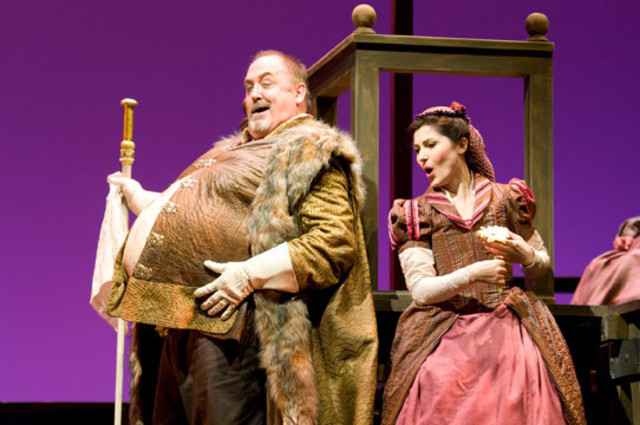Catch It Before It Closes: Falstaff

As the audience trickles into McCaw Hall a half-hour prior to Seattle Opera’s production of Falstaff, there is a measured amount of surprise to find the red curtain is already raised, and the cast puttering away onstage as if they had taken a wrong turn getting to the dressing rooms.
Up there is Peter Rose, who plays the title role. He dips a feather pen in a bottle of ink, ready to compose a letter on parchment paper, tapping his foot to Paolo Conte’s Via Con Me. Bardolph, Falstaff’s aide, is flitting across the wood-planked risers in his heart-speckled boxers, tweeting on his iPhone and gripping a Starbucks latte. Nannetta Ford (played by former Seattle Young Opera artist Anya Matanovic) is fitted for a billowing hoop skirt. It’s hard not to join the flock of onlookers who crowd the orchestra pit to gawk at these period incongruities.
The scene is one of many delightful surprises you find in director Peter Kazara’s ingenious take on Verdi’s final opera, a merger of romance and comedy. Kazara manages to turn tavern brawls and lots of name-calling into something graceful—Falstaff referred to as a “beached whale,” “gross watery pimple,” and “fat-kidney rogue” sounds melodically glorious coming from the pipes of the fresh-faced Sasha Cook and mezzo-soprano Stephanie Blythe, who first debuted as Falstaff’s Mistress Quickly in the Met Opera. And only a cast of this caliber could pull off a perfectly harmonized operatic nonet at the end of the second scene.
It’s not just the voices that make this opera a must-see. Set designer Donald Eastman creates a Globe-like atmosphere using minimalistic objects, allowing the rich costumes and talents to really shine.
The three-act play finishes with a comic fugue that doesn’t quite belong in the opera’s Elizabethan time-frame and doesn’t totally provide closure. Kazara exaggerates Verdi’s misfit ending by leaving his cast as costume-less as they began, playing on the final line “all the world’s a joke.”
It’s a joke you don’t want to miss.
